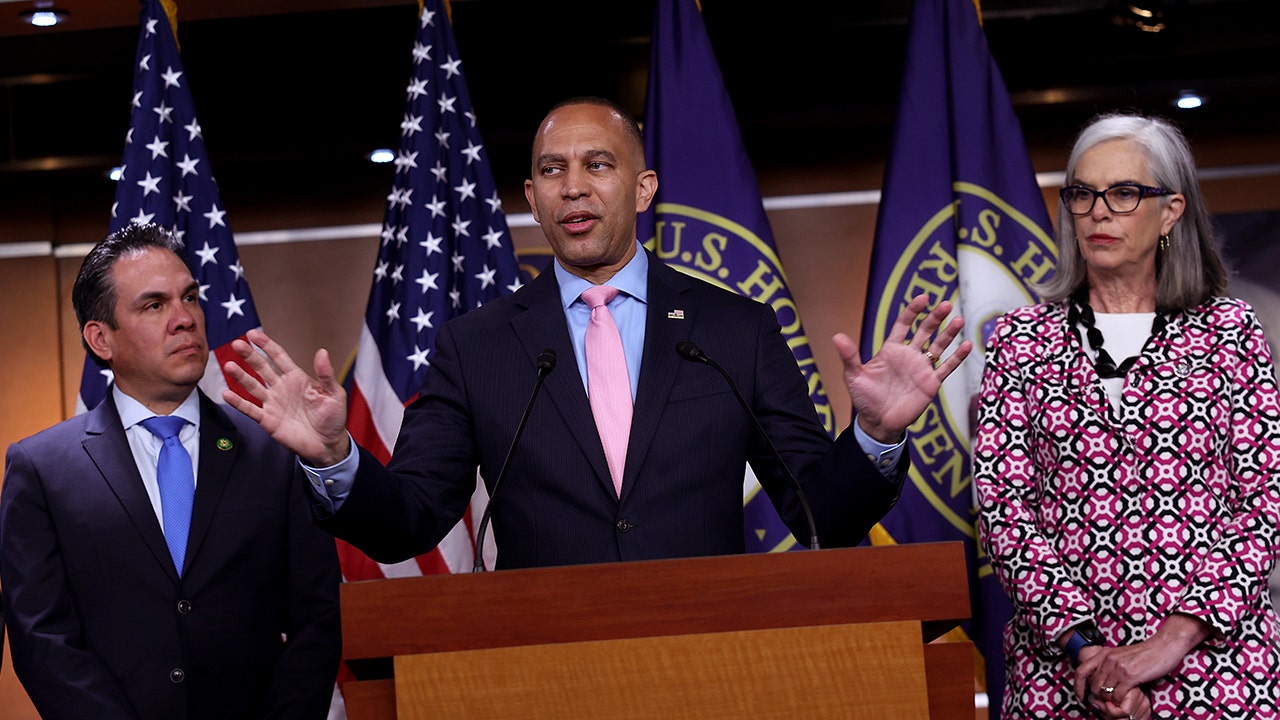How AIPAC Became a Toxic Brand for Democrats in Congress

“J Street supporters now make up 60% of Democratic members of the House and Senate.”
The American political arena is witnessing radical shifts in the Democratic Party's relationship with pro-“Israel” lobby groups.
These shifts underscore the continued reshaping of US policy toward “Israel” within Congress, with growing tension between traditional unconditional support for the Israeli government and growing pressure to support Palestinian rights.
Reflecting the changing public and political mood regarding the Gaza war, there has been a growing shift away from the American Israel Public Affairs Committee (AIPAC) in favor of the center-left J Street.
AIPAC is an American Jewish organization and is considered the most powerful and influential lobby group in the U.S.
Founded in 1953 by Yeshaya Kenan, a former member of the American Zionist Committee for Public Affairs, the organization aims to ensure continued US support for Israel.
For decades, AIPAC has provided financial support to candidates in the US congressional primaries and midterm elections.
All of these efforts were aimed at attracting and mobilizing support for Tel Aviv and opposing the progressive movement that supports Palestine, which includes a number of Democratic representatives, most notably Senator Bernie Sanders.
Democratic Retreat
A growing number of Democratic representatives have begun to abandon their financial support for AIPAC, reflecting an unprecedented shift in congressional positions on “Israel”, particularly in light of the ongoing war on the Gaza Strip and declining American public support for it.
Recently, there has been a noticeable decline in AIPAC's financial support for Democratic representatives, most notably House Minority Leader Hakeem Jeffries, who recently expressed his openness to supporting the left-wing organization J Street.
For the first time in 17 years, Jeffries of New York has publicly endorsed J Street, which advocates for a two-state solution and is widely critical of the current Israeli government.
J Street recently announced its endorsement of the full House Democratic leadership team, for the first time: Democratic Leader Hakeem Jeffries, Democratic Whip Katherine Clark and Democratic Caucus Chair Pete Aguilar.
J Street supporters now make up 60% of Democratic members of the House and Senate.
This move was seen as a significant shift in the Democratic position and a major gain for J Street, given that Jeffries has long had a close relationship with AIPAC, which has provided him with financial and political support for years.
The list of Democratic members of Congress who have announced their refusal to accept donations from AIPAC includes Reps. Morgan McGarvey of Kentucky, Deborah K. Ross of North Carolina and Valerie P. Foushee of North Carolina, reflecting a growing desire to move away from the group's traditional influence in Congress.
Foushee, who was first elected to the House of Representatives in 2022 and received $800,000 in funding from AIPAC, has pledged that her campaign will not accept any AIPAC funding for her 2026 reelection bid.
Other Democratic representatives who have pledged not to receive any AIPAC support include: Rep. Veronica Escobar of Texas, who received $46,000 from AIPAC in 2022, and Rep. Jonathan Jackson of Illinois, who received $15,000 in both 2022 and 2024.
Even Rep. Maxine E. Dexter of Oregon, who benefited from AIPAC's support last year to secure her re-election bid, recently stated the need to stop the transfer of offensive weapons to “Israel” and ensure the flow of humanitarian aid to Gaza.
She is also a cosponsor of the Block the Bombs Act, which seeks to restrict the sale of certain weapons to “Israel” until it meets certain human rights conditions.
All this comes amid a clear decline in the participation of Democratic representatives in annual AIPAC-organized trips to “Israel”.
In 2023, 24 House Democrats, including Jeffries, traveled with AIPAC to Israel. This year, 11 out of the 33 first-term House Democrats attended, while seven others canceled their trips despite having committed to the trip in August.
Some of the new members who did go received backlash in their districts for participating in an AIPAC-aligned trip.
J Street President Jeremy Ben-Ami described the situation as a watershed, emphasizing that the discrepancy between AIPAC's positions and American public opinion has become stark, especially after the Gaza war.

AIPAC's Influence
The New York Times noted that AIPAC has become a toxic brand and a stigma in the eyes of some Democrats in Congress, with the dramatic decline in American support for Israel's war plans in Gaza and the sharp decline in support among Democratic voters for the Jewish state.
A New York Times/Siena University poll conducted between September 22 and 27 showed that a majority of Americans oppose sending additional economic or military aid to Tel Aviv, while support for the Palestinians is increasing at the same time.
This shift reflects a significant turning point in American policy toward “Israel” and poses unprecedented challenges for AIPAC in maintaining its financial and political influence over US lawmakers.
AIPAC has long been an influential force in Congress and has the ability to spend money to defeat lawmakers it deems hostile to “Israel”. It adopted a direct campaign spending strategy for the first time in 2022.
This strategy was supported by millions of dollars from its donors, including Republican billionaires and major donors to President Trump.
Amid growing public outrage over Israel's war on Gaza, AIPAC announced through the United Democracy Project, its super PAC and independent spending arm, that it would spend $100 million on campaigns in 2024.
Over the past year, the committee spent more than $23 million to defeat former Reps Cori Bush and Jamaal Bowman, two progressives who strongly opposed unconditional US aid to “Israel”.
AIPAC also poured more than $1 million into the Oregon Democratic primary, boosting Rep. Maxine E. Dexter's standing in her race against former Commissioner Susheela Jayapal.
When Dexter won, AIPAC joyfully declared the candidate it had endorsed the winner, noting that Dexter's anti-“Israel” challenger had been endorsed by Senator Bernie Sanders and J Street.
However, public opinion has shifted over the past two years of Israel's war on Gaza. While Democrats have increasingly sympathized with the Palestinians in this conflict, AIPAC has remained steadfastly loyal to Israeli Prime Minister Benjamin Netanyahu.
The group has defined Israeli military assault on Gaza as a just and moral war against Hamas, which it says bears full responsibility for the suffering of civilians there.

Radical Shift
Last July, 23 Democratic senators—nearly half of the Democratic caucus—voted in favor of a Bernie Sanders-sponsored bill opposed by AIPAC that banned the sale of assault rifles to Israel.
Last August, a slightly smaller group voted in favor of the Block the Bombs Act, including senators who pledged not to receive money from AIPAC.
Michigan Democratic Senator Elissa Slotkin was absent from that vote but later said she would have supported the measures as well.
Democratic Senator Chris Coons of Delaware told Axios, “If there is no change in the Israeli administration's direction, I will seriously consider it for the first time.”
AIPAC maintains that it retains the overwhelming support of Democrats, believing that supporting Israel is in the best interests of American policy.
AIPAC spokesman Marshall Wittmann commented that most Democratic lawmakers still recognize that Israel is fighting a just and moral war against Hamas terrorism.
He noted that lawmakers' overwhelming vote, 422 to 6, to reject the attempt to cut $500 million in defense aid to “Israel” is evidence that most American lawmakers remain closely aligned with AIPAC.
He also noted that 95% of the Democrats his organization endorsed won their elections last year.
However, despite its abject failure, the proposal to cut defense aid to “Israel” also reflects an ongoing shift on the right regarding AIPAC's influence in Congress.
In a rare move, some anti-interventionist Republicans, including figures from the pro-Trump MAGA base, have questioned the extent of US support for “Israel”.
These criticisms were spearheaded by Rep. Marjorie Taylor Greene (Georgia), and joined by a prominent group, including right-wing radio host Tucker Carlson and Matt Gaetz, Trump's former attorney general pick.
To counter this influence, calls are mounting, particularly from Greene, for AIPAC to be listed under the Foreign Agents Act (FARA), which requires those representing foreign governments to disclose their activities.
However, the lobby has responded to the calls by stating that it is an American organization composed of pro-“Israel” Americans and does not directly represent the Israeli government.
AIPAC is currently considering whether to participate in an attempt to defeat Marjorie in her reelection race next year.
Trump highlighted these moves by stating that the lobby no longer controls Congress as it once did, despite pouring millions of dollars into election campaigns that shifted the balance and changed the equations.

Political analyst Raed Jarrar told Al-Estiklal that “a number of voices within the Democratic Party now view AIPAC's close association with Netanyahu's government as a political burden.”
“With the ongoing internal division over the position on Israel, it appears that AIPAC is gradually losing its influence in Congress, while J Street is trying to establish itself as a major voice representing Democrats in discussions about the Middle East,” he added.
He also emphasized that the shifts sweeping both Democrats and Republicans against the Israeli government do not mean that traditional American policy toward Tel Aviv will change overnight.
He noted that AIPAC remains the undisputed most powerful lobby in Washington, but there are indications that change is inevitable, even if it takes some time.











